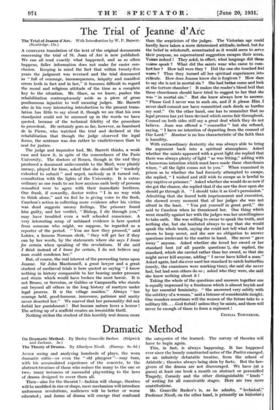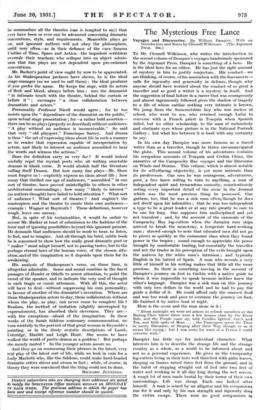Dramatic Method
The Theory of Drama. By Allardyce Nicoll. (Harrap. 8s. 6d.)
AFTER seeing and analysing hundreds of plays, the worn dramatic critic—or even the " old playgoer "—may turn', with his accumulated experience of the concrete, to the abstract treatises of those who reduce the many to the one or two; many instances of successful playwriting to the laws of drama designed to cover them all.
Then—alas for the theorist !—fashion will change, theatres will be modified in size or shape, mere mechanism will introduce unforeseen revolutions, audiences will be better or worse educated ; and forms of drama will emerge that' confound the categories of the learned. The survey of theories will have to begin again.
This, in fact, is always happening. It has happened ever since the loosely constructed notes of the Poetics emerged, as an infinitely debatable treatise, from the school of Aristotle ; theories always being slain by facts. But the law- givers of the drama are not discouraged. We have (at a guess) at least one book a month on abstract or personified Tragedy, Comedy and the other distinguishable " kinds " of writing for all conceivable stages. Here are two more contributions.
Mr. Granville Barker's is, as he admits, " technical." Professor Nicoll, on the other hand, is primarily an historian.;
he summarizes all the theories (one is tempted to say) that ever have been or ever can be advanced concerning dramatiii conventions, style, and requirements. Meanwhile plays gO on, and ignorant authors will not obey the philosophers; until- Very often-----as in their defiance of the once famous unifies of Time, Space and .Actionthe impudent scribblers overrule their teachers; who collapse into an abject admis= sion that fine plays are not dependent upon pre-ordained conventions.
Mr. Barker's point of view ought by now to be appreciated.
As his Shakeepearian prefaces have shown, he is the ideal stage-manager (as- we used to call them) ; the ideal producer if you prefer the name. He keeps the stage, with its actors of flesh and -blood, always before him ; sees the dramatist " in intimate touch with the theatre, behind the curtain or before it " ; envisages " a close collaboration between dramatists and actors."
' Presumably Professor Nicoll would agree ; for he too insists upon the " dependence of the dramatist on the public," upon actual stage presentation ; for---a rather bold assertion— there Can be no plays (proPerly so described) without audiences. " A play without an audience is inconceivable." So said that very " old playgoer," Francisque Sarcey. And drama is thus " the art of expressing ideas about life in such a manner as to render that expression capable of interpretation by actors, and likely to interest an audience assembled to hear the words and witness the actions."
Does the definition carry us very far ? It would indeed usefully repel the myriad poets who sit writing unactable dramas in blank verse. It would abolish half the literature calling itself Drama. But how many fine plays—Mr. Shaw must forgive us !—explicitly express no ideas about life ; how many that thrilled one 'age of audiences, " assembled " in one sort of theatre, have proved unintelligible to others in other architectural surroundings ; how many " likely to interest " (as authors thought) have failed to hold attention ? What sort of audience ? What sort of theatre ? And oughtn't the masterpiece and the theatre to create their own audiences— example : Wagner at Bayreuth ? These definitions, however rough, leave one uneasy.
But, in spite of his teclmicalities, it would be unfair to accuse Mr. Barker at least of submission to the fashions of the hour' and of ignoring possibilities beyOnd this ignorant preseid. He demands that audiences shOuld be made to hear, to listen, to feel, and to imagine. And all through his brief, subtle book he is concerned to show how the really great dramatic poet or " maker " must adapt himself, not to passing tastes, but to the Perhaps eternal laws of the human voiCe, of the chosen situ- ation; and of the imagination as' it depends upon them for its awakening.
His analysis of 'Shakespeare's verse, on those lines, is altogether admirable'. Sense and sound Combine in the finest passages of Hamlet or Othello to arrest attention, to point the mood of the speaker, and to indicate the very 'soul of thought in each tragic or comic _utterance. With all this, the actor will have to deal—without suppressing his own persOnality, in favour of another of the dramatist's invention.' Where are those Shakespearian actors to-day, those collaborators without whom the play, as play,. can never come to complete life ? Realism, the method of imitation (slightly interrupted by expressionism), has absorbed their cleverness. They are— with few exceptions—afraid of the imagination. In these weeks of the Sarah Siddons centenary commemoration, we turn wistfully to the portrait of that great woman in Reynolds's painting, or in the dimly ecstatic descriptions of Lamb, Coleridge, Hazlitt and Leigh Hunt. She seems to have walked the world of poetic drama as a goddess ! But perhaps she merely ranted ? So the younger actors assure us.
And they go on murmuring their phrases in the latest, very real play of the latest sort of life, while we look in vain for a Lady Macbeth who, like the Siddons, could make hard-headed dramatic critics shiver and swoon in fact ; while, of course, in theory they were convinced that the thing could not be done. .
RICHARD JENNINGS.











































 Previous page
Previous page